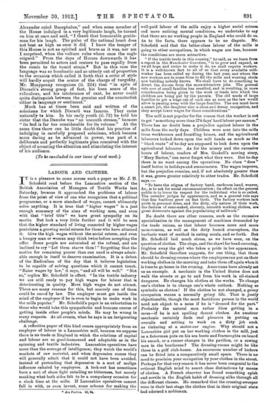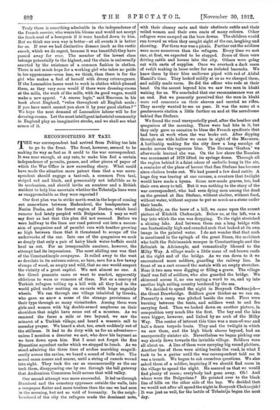LABOUR AND CLOTHES.
IT is a pleasure to come across such a paper as Mr. J. H. Schofield read before the Lancashire section of the British Association of Managers of Textile Works last Saturday, because it approached the problems of labour from the point of view of one who recognizes that a political programme, or a mere standard of wages, cannot ultimately solve anything. It is true that "higher wages" is a just enough summary of the aims of working men, and even with that "brief title" we have great sympathy on its merits. But look a very little further and it will be seen that the higher standard of living connoted by higher wages postulates a growing social esteem for those who have attained it. Give the high wages without the social esteem, and even a hungry man or woman may think twice before accepting the offer. Some people are astonished at the refusal, and are inclined to cry "Let them starve then ! " forgetting that the motive for remaining poorer than one need is always admir- able enough in itself to deserve examination. It is a defect of the Radicalism of the day that it believes legislation to be capable of solving questions which it cannot touch. "Raise wages by law," it says, "and all will be well." "Not so," replies Mr. Schofield in effect. "In the textile industry we are still ready to pay high wages for labour that is deteriorating in quality. Mere high wages do not attract. There are many reasons for this, but scarcely one of them could be cured by law. The employer must get inside the mind of the employee if he is even to begin to make work in the mills popular." Mr. Schofield's paper is an exhortation to those who would take this sympathetic and humane course of getting inside other people's minds. He may be wrong in many respects. At all events, what he says is an invigorating challenge.
A reflective paper of this kind comes appropriately from an employer of labour in a Lancashire mill, because we suppose there is no trade in England in which the relations of capital and labour are so good-humoured and adaptable as in the spinning and textile industries. Lancashire operatives have more than the average of intelligence; they watch the world's markets of raw material, and when depression comes they will generally admit that it could not have been avoided, instead of pretending that depression is a sort of malign influence exhaled by employers. A lock-out has sometimes been a sort of sham fight entailing no bitterness, but merely masking what both sides felt to be a compulsory occasion for a slack time at the mills. If Lancashire operatives cannot fall in with, or even invent, some scheme for making the • drs Portica. 93, 94. well-paid labour of the mills enjoy a higher social esteem and more enticing mental conditions, we undertake to say that there are no working people in England who could do so. As to the facts, there appears to be no dispute. Mr. Schofield said that the better-class labour of the mills is going to other occupations, in which wages are less, because
the conditions are more attractive.
" If the textile trade in this country," he said, as we learn front a report in the Manchester Guardian, "is to grow and expand, as we all hope and strive to make it do, we shall require workers. It is a well-known fact to all of us that every available mill- worker has been called up during the last year, and where the new workers are to come from to fill the mills and weaving sheds now building nobody knows. We shall have to do something to divert the stream from the more attractive jobs. The general rule now of small families has resulted, and is resulting, in more consideration being given to the work or trade into which the children are being put by the parents. The old needs of largo families to get a wage out of each one as soon as the law would allow is passing away with the large families. The son must have a smart job, the daughter also a clean and dressy occupation, and they accept lower wages for these considerations."
The mill is not popular for the reason that the worker is out
to get "something more than 274 days' hard labour per annum." There has no doubt been a prejudice against labour in the mills from the early" days. Children were sent into the mills from workhouses and foundling homes, and the agricultural labourers looked down upon the mill hands as much as the black coats" of to-day are supposed to look down upon the
agricultural labourer. As for the misery and the excessive hours of labour, readers of Mrs. Gaskell's moving story, "Mary Barton," can never forget what they were. But to-day there is no want among the operatives. No class "does" itself better in holidays and amusements. The wages improve,
but the prejudice remains, and, if not absolutely greater than it was, grows greater relatively to other trades. Mr. Schofield says :—
"To have the stigma of factory hand, cardroom hand, weaver, is to ask for social excommunication ; its effect on the general public is to lower its respect for the individual who is so called. The outsider judges by appearances, and as a general rule says that fine feathers grow on fine birds. The factory workers lack pride in personal dress, and the dirty, oily nature of their work, the fashion of semi-naked, slovenly, uncouth working clothes, are great deterrents against the popularizing of millwork."
No doubt there are other reasons, such as the excessive specialization in the management of machines demanded by the trade unions, so that labour becomes more and more monotonous, as well as the dirty humid atmosphere, the barbaric want of method in eating meals, and so forth. But Mr. Schofield laid much stress, as we have seen, on the question of clothes. The clogs, and the shawl for head-covering, frighten away the girl who takes a pride in her appearance.
Mr. Schofield therefore suggests, for one thing, that there should be dressing-rooms where the employees can put on their working clothes in the morning and take them off again when it is time to go home in the evening. Americans have already set us an example. A mechanic in the United States does not walk the streets or go to and from his work in oil-stained dungaree. He changes his clothes at the works. To change one's clothes is to change one's whole outlook. Nothing so symbolic as clothes ! If the clothes be not changed, a grimy occupation means a normally grimy life. That is justly objectionable, though the most fastidious person in the world need not object to a mess if be is "dressed for the part." Probably the natural man rather likes getting in a
mess—if he is not spoiling decent clothes. An amateur
mechanic certainly finds real pleasure in putting on overalls and setting to work on a dirty job such as tinkering at a motor-car engine. Why should not a Lancashire girl put on her working clothes in the mill, just as a fisherman puts on his sea boots and fearnoughts on board his smack, or a runner changes in the pavilion, or a rowing man in the boathouse ? The dressing-rooms might be like those in a golf club-house. An enormous number of lockers can be fitted into a comparatively small space. There is no need to proclaim your occupation by your clothes in the street. Perhaps for that very reason it has never been congenial to the reticent English mind to assert class distinctions by means of clothes. A French observer has found something apish and servile in the English habit of dressing alike through all the different classes. He remarked that the crossing-sweeper wore in their last stage the clothes that in their original state had adorned a nobleman. Truly there is something admirable in the independence of the French ouvrier, who wears his blouse and would not accept the frock-coat of a bourgeois if it were handed down to him. But we think our own way is better—at all events it is better for us. If over we had distinctive dresses (such as the rustic smock, which we do regret, because it was beautiful) they have passed away for ever. The member of the lowest class belongs potentially to the highest, and the claim is universally asserted by the existence of a common fashion in clothes. There is not much hope for a working girl who takes no pride in her appearance--even less, we think, than there is for the girl who makes a fool of herself with dressy extravagance. If the Lancashire lasses went to work in clothes which pleased them, as they very soon would if there were dressing-rooms at the mills, the work of the mills, with its good wages, would make a new appeal. "A coarse logic," said Emerson in his book about England, "rules throughout all English souls : if you have merit cannot you show it by your good clothes?" We hope the next demand of Lancashire labour will be for dressing-rooms. Let the most intelligent industrial community in England play an imaginative stroke, and we shall see what comes of it.



















































 Previous page
Previous page